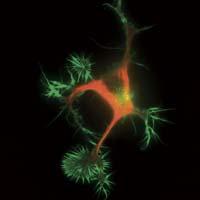Molecules to alleviate the damage of radioactivity
2012/06/28 Carton Virto, Eider - Elhuyar Zientzia Iturria: Elhuyar aldizkaria
 400
400
The journal Nature Medicine of June has received two proteins that help to alleviate the bodily damage caused by radioactivity. In the experiments carried out with the mouse, it is observed that at 30 days after the application of the lethal dose of radiation, the survival rate was significantly higher in the specimens treated with thrombomodulin and activated protein C. The study consisted of a series of sessions with groups of 30 mice that have treated mice 30 minutes, 1 h, 2 h, 24 and 48 after receiving the lethal dose of radiation. In mice who have received treatment from 24 to 48 hours, the 30-day permanence rate has been 70%, while in control groups it has been 30%.
These proteins have body anticoagulant functions that are naturally formed in different cells. In addition, thrombomodulin is activator of protein C. However, the researchers have found no relationship between this function and the protection mechanism. Researchers from the Cincinático Children's Medical Hospital and the Wisconsin Blood Research Institute consider that the mechanism that helps cells to alleviate the damage of radioactivity is another. Although they have not been able to conclude in the sessions carried out by them, for example, they have seen that only the injection of activated protein C is more effective than the injection of thrombomodulin, although the second is activating the first.
The results obtained in the mouse, and the fact that both proteins have been used previously in humans in search of other therapeutic effects, have turned them into interesting candidates against the effects of radioactivity.

Gai honi buruzko eduki gehiago
Elhuyarrek garatutako teknologia




